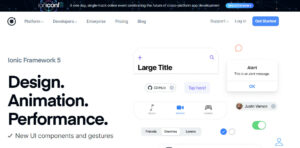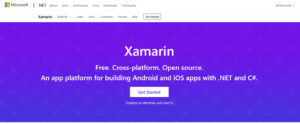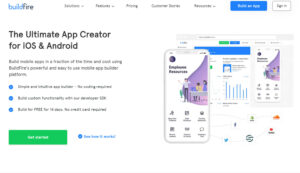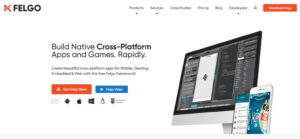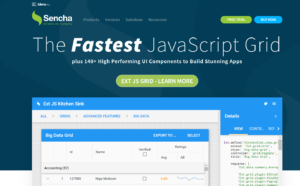This post will explain mobile app development software. The widespread use of smartphones has necessitated the creation of mobile applications. Contracting a development company, whether for personal or corporate reasons, costs a lot of money. That isn’t something that everyone has.
12 Best Free & Open Source Mobile App Development Software
In this article, you can know about mobile app development software here are the details below;
With the help of phone app development software, you can now construct your own app. You don’t need any prior coding skills or large sums of money to get started.
This list of mobile app development platforms might assist you in creating an app with the proper structure. Let’s have a little glance at some of the best free and open-source mobile app development software options.
1.PhoneGap
PhoneGap is a well-known open source mobile app development software that lets you construct hybrid apps. The developer does not need to be familiar with mobile programming languages in order to use PhoneGap. Instead, users can get started with app design software using languages like CSS, HTML, and JavaScript.
In reality, it enables you to design apps that function across numerous platforms with a single codebase, allowing you to reach the widest possible audience.
- Allows you to view and control any changes in the app via PhoneGap • Works on numerous operating systems, including iPhone, Android, & Windows Pros • Easily connects with various libraries for designing the app
- A single code that can be used across numerous platforms
- Lack of UI widgets • Rapid testing and deployment
2. Flutter
Flutter is a unrestricted mobile app development software that excels at hybrid apps. It is written in C, C++, and the Skia Graphics Engine, and is one of the newest members in the mobile app development sector. Also check invoicing software
It is Google’s user interface toolkit that allows you to construct mobile, web, and desktop applications from a single codebase. Furthermore, when testing your project, you do not need to restart the application. It has the Hot Reload feature, which makes the entire development process stress-free and efficient.
Features • Incorporates all essential platform differences such as navigation, scrolling, icons, and fonts • Provides fully customizable widgets to allow for rapid native app development • Creates plugins utilising channels that are simple to use by any developer
Pros
- Expressive and adaptable user interface • Creates native interfaces in minutes
Cons • Limited library collections
3. Ionic
Ionic is another another excellent free, open-source mobile app development software that is primarily used to create hybrid apps. The finest part is that you can use a single codebase to create apps for several platforms, including Android, iOS, and the web.
Furthermore, it has user-friendly UI components that help to speed up the app development process. Furthermore, it can be used almost anyplace. Ionic has more than 120 native device features, preconfigured elements, and a big developer community.
- Written in JavaScript, the application is covered by the MIT licence • Allows for Cordova-based app mobile Pros
- A wide range of integration capabilities • Popular technologies and ease of learning
Cons
- No hot reloading is allowed
4. Xamarin
Microsoft created Xamarin in 2011 as a free and open source mobile app development tool. It’s a suite of tools that allow programmers to create programmes for a variety of operating systems, including Windows, Android, and iOS, using a single programming language.
The fact that Xamarin employs the C# programming language is one of the reasons for its popularity. In addition, the Xamarin Test Cloud allows you to test apps on over 2,000 genuine mobile devices.
- Easily interfaces with current backend services, components, native APIs, and more • Provides a real-time testing module to monitor and catch app faults as they occur
- Allows you to create beautiful cross-platform user interfaces
Pros
- Microsoft’s full technical support • Cand.flexibility #’s NET’s
- Not for the development of video games
5. Buildfire
Buildfire is another great option for free mobile app development software. It provides a comprehensive set of tools for creating Android and iOS apps. It’s known for high-end custom development as well as an easy-to-use DIY platform.
Furthermore, it now supports over 10,000 apps and is adaptable enough to scale as your company grows. The simple and functional drag-and-drop UI, which makes it easy to construct the app rapidly, is also worth noting.
- Allows you to create new functionality with their developer SDK • Provides an interactive, intuitive app builder that requires no coding • Can be used with any third-party APIs or pre-built connectors
- Advanced development features are included.
- It has a fantastic social networking feature.
Cons
- Unreliable customer service
6. Felgo
Felgo is a unrestrained mobile app development software that supports a wide range of platforms, including iOS, Android, Windows and Linux desktop, and more. You can construct applications for several operating systems using a same codebase.
In comparison to the other 40 prominent tools, it was placed first as the most time-saving framework, easiest to use, and finest support system. It’s also a wonderful technology for creating game apps because it supports 3D objects. Also check video editing software
Features • Reduces interaction between the native layer and the runtime environment by using custom UI rendering • Provides a well-designed abstraction of platform-specific ideas • Supports both commercial and gaming apps
Pros
- Simple to understand and use • Reliable performance with fewer bugs
N/A
7. Appcelerator
Appcelerator is a popular mobile app development software that is available in both premium and free editions. It allows developers to use JavaScript, a popular scripting language, to create native mobile apps.
Furthermore, developing apps requires less lines of code because it enables for code reuse across platforms. Multiple operating systems, including Windows, iOS, Android, & browser-based HTML5 applications, are supported by the software.
- Allows you to get a live view of all the changes being performed in a preview window • Its cloud capacity provides mobile-optimized permit to any data source • Gives you full & direct access to iOS and Android APIs using JavaScript
Pros
- Rapid prototyping • A single codebase that can be used across multiple platforms
Cons
- A lot of try and error
8. Mobincube
Mobincube is a web-based software that allows people to create apps without knowing any programming languages. It comes with a mighty set of tools that allow you to create mobile stores, customise every element, design your own complex capabilities, and much more.
It also has a great app interface, and you can use it to make whatever kind of app you want – entertainment, health, instructional, and so on.
- Allows you to easily integrate third-party solutions into your app • Allows you to publish apps on many platforms such as Amazon, Google Play, and others • Allows you to add your own POIs to online maps
Pros • Extremely adaptable • Allows for complete customization
Cons
- A user’s guide is missing.
9. LongRange
LongRange is a Cobol, CL, and RPG-based native mobile application development tool. It does not necessitate knowledge of HTML, CSS, or JavaScript. It allows for quick development and maintenance of mobile applications. It includes commands, form views, and navigation tabs, among other features.
- Develop native apps using only CL/RPG/DDS • Take advantage of mobile features like the camera, GPS, audio, SMS, and more
- Automatically push mobile app updates to devices Pros • Lower mobile app maintenance and extension costs • Native app execution is faster
- For quick app development, there is a high amount of reliance on current tools.
10. Qt
Qt’s cross-platform framework enables you to design, create, and deploy mobile apps for a variety of portable, handheld iOS, Android, and Windows devices at a cheap cost. The free and open-source platform offers a complete and welcoming development environment for creating outstanding user experiences. Originally, the time-tested and reliable approach was used to develop software for Windows and Mac.
- Support for opaque private keys • Support for dual-mode networks and IPv6 • Workarounds for buggy SSL servers
- A vast community of expert developers and years of documentation are available.
- Increased process complexity due to the meta-object compiler 11. •
11. Alpha Anywhere
Alpha Anywhere allows rapid development and deployment of cross-platform web and mobile apps using no-code and low-code environments. It creates offline-capable apps by combining HTML and JavaScript. It is known as a comprehensive explanation that can be used to construct mobile apps as well as desktop, online, and SaaS applications. It also retains a large library of lessons to help you speed up the app development process. Also check SAP alternatives
- Enterprise-grade HMAC data encryption & SSL support • Offline-capable mobile app development • Fine-grained resource management delegation Pros • Pre-built customizable sample applications that may also be used for reference or cross-verification • Extensive backend access Cons
12. Sencha Ext JS
Sencha Ext JS is a fabolous JavaScript framework that allows you to construct highly responsive mobile apps that improve customer satisfaction. It allows for the quick design, development, and maintenance of cross-platform, data-intensive apps that work on all Android, iOS, and Windows devices. Sencha Ext JS-based mobile apps include outstanding business intelligence features that help with data visualisation and analytics.
- Built-in, native-like themes for all major platforms • Supported on WebKit browsers • Excellent animations and increased touch event support
- Uses PhoneGap/Cordova to provide native API access and packaging.
- A backend data package that can deal with numerous data sources separately.
- It’s not for folks who want to make apps that are as near to native as possible.
Final Thoughts
While each of the mobile application development tools included on this page has its own set of advantages and disadvantages, they are all capable of producing highly intelligent, user-friendly, and customer-focused mobile apps, which have become the norm. Every project has its own cluster of specifications. We recommend that you think about them as you search for the best mobile app software.




